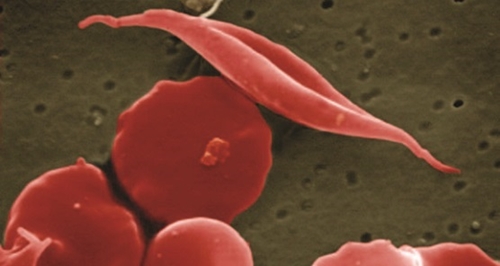
Red blood cells with sickle cell disease (NCATS.NIH.gov)
7 July 2017. The Food and Drug Administration today approved a new drug that reduces the tendency for blood cells in people with sickle cell disease to stick together and block blood vessels. The drug, a form of the amino acid L-glutamine, is marketed by Emmaus Medical Inc. in Torrance, California under the brand name Endari.
Sickle cell disease is a genetic blood disorder affecting hemoglobin, a protein in blood that delivers oxygen to cells in the body. People with sickle cell disease have hemoglobin molecules that cause blood cells to form into an atypical crescent or sickle shape. That abnormal shape causes the blood cells to break down, lose flexibility, and accumulate in tiny capillaries, leading to anemia and periodic painful episodes. Sickle cell disease is prevalent worldwide, and affects 70,000 to 80,000 people in the U.S., including about 1 in 500 people of African descent.
L-glutamine is an amino acid, a basic building lock of proteins, that helps reduce the damage from oxidation that occurs when blood cells become misshaped. The drug is given in oral form, with the dosage dependent on the size and weight of the patient. FDA approved the drug for patients as young as 5 years.
The agency approved the drug in part as a result of an intermediate-stage clinical trial testing L-glutamine against a placebo among 81 participants with sickle-cell anemia and beta-thalassemia, a related disorder. Effects of the drug were tracked for 48 weeks, looking primarily at painful sickle-cell crises, but also a number of related factors, such as emergency room visits, activity levels, growth curves in children, and overall blood health, as well as signs of adverse effects.
Results show participants receiving L-glutamine experienced fewer pain episodes requiring hospitalization than placebo recipients, as well as fewer acute chest syndrome incidents — a complication of sickle cell disease — and fewer days in the hospital for any reason. Common side effects were constipation, nausea, headache, abdominal pain, cough, pain in the extremities, back pain, and chest pain.
“Endari is the first treatment approved for patients with sickle cell disease in almost 20 years,” says Richard Pazdur, acting director of FDA’s Office of Hematology and Oncology Products in an agency statement. “Until now, only one other drug was approved for patients living with this serious, debilitating condition.”
FDA granted L-glutamine orphan drug status that provides incentives to pharmaceutical makers to develop drugs for diseases affecting fewer than 200,000 Americans. The agency also helped supported the clinical trial, with funding from its Orphan Products Grants Program. At the end of June, FDA Commissioner Scott Gottleib announced a plan to eliminate the agency’s backlog of orphan drug applications.
More from Science & Enterprise:
- Trial Begins of Freeze-Dried Blood Plasma
- Electronic Gene Editing Corrects Inherited Blood Disorder
- Novartis Acquires Sickle-Cell Drug Developer
- Blood Stem Cell Start-Up Launches, Earns $48.5M Funding
- Gene Editing Negates Sickle Cell to Create Healthy Blood
* * *

 RSS - Posts
RSS - Posts
You must be logged in to post a comment.